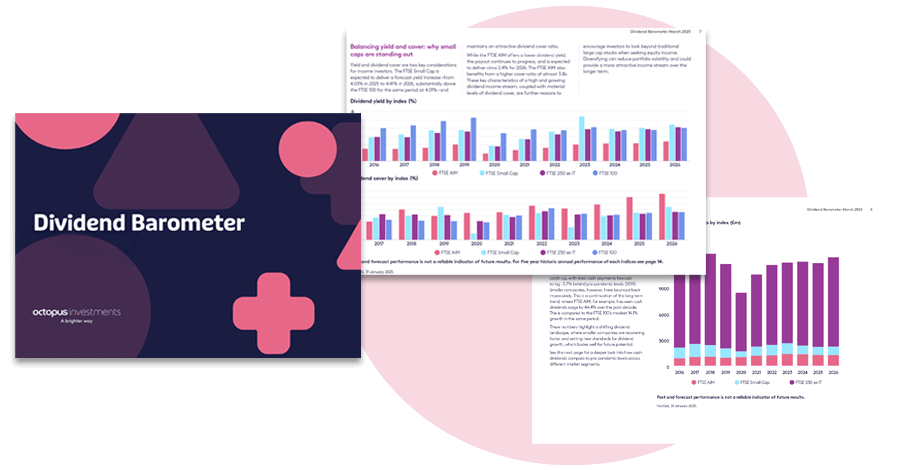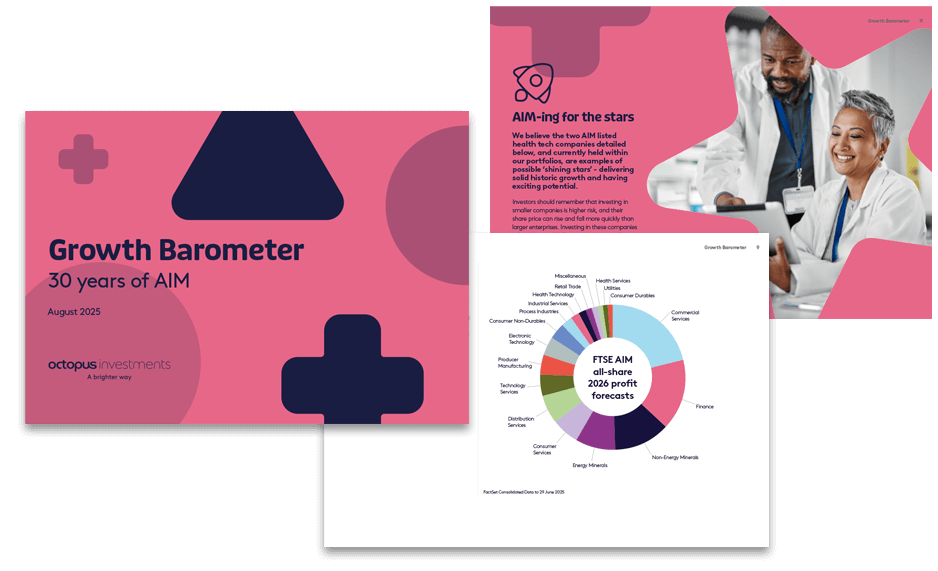Thanks!
Your client’s key objectives were:
- Investment objective: High growth
- Tax objective: Income tax planning
The results:
Based on the objectives you selected, we’ve suggested tax-efficient investments you might want to consider.
We’ve broken these suggestions down by those that meet:
- Both the investment and tax objective
- The investment objective only
- The tax objective only
| Investment and tax objective | Investment objective | Tax objective |
| Enterprise Investment Scheme | Enterprise Investment Scheme or Business Relief (AIM) | Enterprise Investment Scheme or Venture Capital Trusts |
Tax-efficient investments
What is the Enterprise Investment Scheme?
Investors in an EIS portfolio own shares directly in a portfolio of early-stage companies. EIS typically appeals to experienced investors who want to back companies with high growth potential. Investors can claim generous tax reliefs because of the risks involved, which include loss relief when an underlying investment returns less than they invested.
What are the reasons to invest?
High growth potential
Access to high-risk opportunities with the potential for high growth.
Tax reliefs
Reliefs include upfront income tax relief, tax-free growth, loss relief, capital gains tax deferral, and inheritance tax relief.
Diversification
Access early-stage companies investors wouldn’t hold in a mainstream investment.
Points to consider
An EIS portfolio invests in small early-stage companies. The combination of tax reliefs available makes an EIS-qualifying portfolio a compelling structure through which to target high growth.
Investors must hold shares for a minimum of three years to keep certain tax reliefs claimed and should be prepared to hold their shares for significantly longer to allow time for growth and liquidity.
What are Venture Capital Trusts?
Venture Capital Trusts invest in a diversified portfolio of early-stage companies. Investors benefit from the VCT owning small stakes in a large number of companies across different sectors.
What are the reasons to invest?
Income tax relief
Investors can claim upfront income tax relief equal to 30% of their investment up to the first £200,000 invested each tax year.
Tax-free dividends
The tax-free dividends paid by a VCT can create an additional income.
Diversification
VCTs give investors access to smaller companies they may not otherwise hold.
Points to consider
VCTs were created by the UK government to fund the growth of early-stage companies by encouraging investment into UK high growth small businesses. They’re a long-term investment and clients should be prepared to hold their shares for a minimum of five years, otherwise any income tax relief claimed will need to be repaid.
What is Business Relief?
Business Relief (BR) is an established relief that allows certain investments to be left to loved ones free from inheritance tax. Compared to options like gifting, it can offer a faster solution to inheritance tax and doesn’t put capital permanently out of reach.
What are the reasons to invest?
Fast inheritance tax exemption
BR-qualifying investments can be free from inheritance tax after just two years.
Access and control
Investors retain access to their wealth and can request to sell their shares at any time, subject to liquidity.
Growth
BR-qualifying investments give investors the opportunity to grow their capital, with a range of products available to suit different appetites.
Points to consider
An inheritance tax service that invests in unquoted Business Relief-qualifying companies selects businesses that are not listed on any stock exchange. These typically target a steady, predictable return.
AIM inheritance tax services invest in Business Relief-qualifying companies that are listed on the Alternative Investment Market (AIM). They offer the potential for high growth.
Risks to bear in mind
Capital at risk
The value of an investment, and any income from it, can fall as well as rise. Investors may not get back the full amount they invest.
Volatility and liquidity
VCT, smaller and unquoted company shares could fall or rise in value more than other shares listed on the main market of the London Stock Exchange. They may also be harder to sell.
Qualification status
Tax reliefs depend on VCTs maintaining their qualifying status or portfolio companies maintaining their BR- or EIS-qualifying status.
Tax treatment
Tax treatment depends on individual circumstances and could change in the future.
Enterprise Investment Schemes from Octopus
Octopus Ventures Knowledge Intensive EIS Fund
closed
A Knowledge Intensive EIS Fund managed by the same team as our EIS service, which benefits from the same pipeline of investment opportunities.
Octopus Ventures EIS Service
closed
A portfolio of around 10 -15 early-stage businesses with high growth potential, selected by one of Europe's most established venture capital teams, that offers a number of valuable tax reliefs which offer some compensation for taking on high risk.
VCTs from Octopus
Octopus Apollo VCT
open
A portfolio of around 45 established smaller companies which targets commercialised businesses looking to scale.
Octopus Titan VCT
closed
The UK’s largest VCT invests in a portfolio of over 140 early-stage companies with the potential for high growth.
Octopus Future Generations VCT
closed
The Octopus Future Generations VCT is an opportunity for investors to share in the growth of purpose driven companies.
Octopus AIM VCTs
closed
Two VCTs featuring established portfolios of around 80 AIM-listed companies with growth potential.
We’re here to support you
If you’ve got a question about any of our products or services, please get in touch.
Get in touch
Out of office hours? Use our form and we’ll do our best to contact you within 24 hours.
Call us
Use our postcode search to find the contact details of the people who look after your firm.





